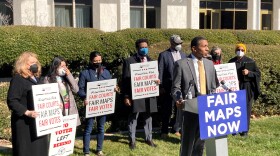There are two interviews that have changed my life.
Ironically, I wasn’t present for either of them. They both happened before I was born. The first is of my Grandpa Charlie, my namesake. A few years before he died in 1989, he sat down with a relative and shared stories from his life on tape. I never got the chance to meet my grandfather, but hearing his voice through a fuzzy recorder transported me to the seat right next to him. Listening to him — getting to know him through his narrative — confirmed for me the power in audio storytelling and oral history.
The second interview is of Pauli Murray, who died in 1985. But a few years earlier, in 1976, the social justice trailblazer spent hours talking with Genna Rae McNeil for the Southern Oral History Program. Throughout the interview, the two women* canvas Murray’s life — from her upbringing in Durham, N.C. to her reasons for entering seminary in the early 1970s.
We must accept the challenge of our existence. Our existence being that of a rejected, unwanted, persecuted minority and that in a sense, we cannot accept this. We must make our contribution to history.
These words from Pauli Murray are some of the most powerful to come out of her conversation with McNeil. After listening to Pauli recount her life, and learning more about her work advocating across the spectrum of human rights, it’s obvious Pauli accomplished this call to action: she undoubtedly made her contribution to history.
I first heard the interview a few years ago. At the time, I had a general sense of who Pauli Murray was, and how she consistently pushed this country toward progress as an activist, a legal scholar, a poet, and a priest. But hearing her divulge about her experiences as an unwavering advocate for change, in her own voice, unlocked something else in me. The interview crystallized my penchant for centering first-person narratives in storytelling. And it made me ask some hard questions of our society and of myself.
Murray’s legal writings helped lay the foundation for the successes of judicial giants like Thurgood Marshall and Ruth Bader Ginsburg. Her coalition-building helped start the National Organization for Women (NOW) in the mid-1960s. Her influence as the first Black woman Episcopal priest led the church to elevate her to sainthood in 2012. All of her actions — and, in turn, her achievements — were led by a devotion to rejecting the status quo.
You say I can’t and I’ll show you I can even if I die trying.
Murray carried a steadfast identity as a firebrand throughout her life. This was seen in 1940 when Pauli was arrested for challenging segregation laws on a bus traveling from New York to North Carolina. It was illuminated again when she entered seminary in the early 1970s even though the Episcopal Church was not yet ordaining women. It was in full force when she applied to UNC-Chapel Hill for graduate school in 1938, despite the school’s segregation policy.

More than 75 years later, I graduated from the same institution that chose to reject Pauli Murray because she was Black. I reaped the benefits of an opportunity she was denied, all the while attending classes inside buildings named after racist men who defended the systems of white supremacy Murray devoted her life to dismantling.
I feel as fully an American as anyone else. This is my country, nobody will rob me of my birthright. I have as much right to speak as an American as anyone else.
The January 6th insurrection on the Capitol, led by a mostly white mob of flag-wielding, self-proclaimed “patriots,” has made it unavoidable to ask what it really means to be an “American” today. Witnessing the attack has caused many, including myself, to be reluctant to adopt a sense of patriotism right now.
During Murray’s conversation with McNeil, she references her personal identity as an American, and offers glimpses at what she regards as “patriotism.” For example, she recounts a time she visited the National Archives Museum in Washington D.C.
I want to see America be what she says she is and I consider it part of my responsibility to do that. It’s a kind of patriotism …well, let me give you a symbol of it. When I went down to look at the archives, to look at the Declaration of Independence and the Constitution of the United States for the first time… here was a uniformed Black American standing as the guard of honor to protect these two hallowed documents, from the point of view of our history. To me, there was such great symbolism in that, that it was Black America who was safeguarding the true meaning of the Declaration of Independence and the Constitution of the United States. Well, poetic people tend to deal in symbols, but it just happened that this is the way I saw it.
Hearing Murray in depth on the subject of being an American led me to wonder how she would feel about this current moment in history.
First, what does she see as the “true meaning” of our nation’s founding documents — texts that defined extremely limited rights when they were created? Would she similarly believe these documents’ ethos were being “safeguarded” last summer as millions of people protested in the streets against police brutality and the killings of Black and Brown Americans?
And what exactly is Pauli Murray’s “patriotism”? Why does she see it as her duty to offer anything back to a society that created and upheld barriers for her as a Black queer woman?
It’s these lingering questions, rooted in Murray’s complexities, that motivated me as I produced “Pauli,” a podcast series inspired by her life’s work and continued contributions to social justice discourse today.
I wanted to dig more into the person behind the progressive policies, and try to figure out how she could retain a spirit of hope, a sense of loyalty, and a desire for harmony and reconciliation in a country that has overtly excluded, and systemically inhibited, marginalized communities. Because if a queer Black woman who came of age in the South during Jim Crow could do it — why couldn’t I, a young white man, do the same?
I can’t say with confidence that I’m closer to knowing the answers, but I do feel closer to Pauli Murray after spending so much time listening to her and to the people she influenced. Murray’s faithful resilience continues to amaze and perplex me. Because of this, I’m more willing to consider Murray’s prescription of patriotism. I’m imagining it’s one that doesn’t necessarily rely on a flag or even an anthem. Instead, it’s grounded in a conviction to prove those who say “you can’t” wrong, to never settle for the status quo, and to make your contribution to history.
*A note that Pauli Murray publicly identified as a woman during her lifetime, but did make references to herself as a man in private life. Several scholars of her work have suggested that Murray was non-binary, gender fluid or transgender.








